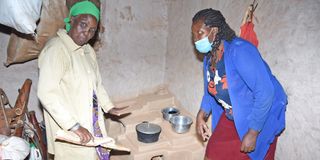Group's Chepkube jiko transforming cooking in Uasin Gishu

Esther Chepkemboi a member of Kalyet Women’s Group (left) with Sophie Koech, coordinator of Soroptimist International demonstrate how the Chepkube works.
What you need to know:
- Kalyet Women’s Group in partnership with the Soroptimist International Organisation Eldoret Club, have come up with an improvised traditional jiko.
- 'Chekube' prevents women, who are mostly tasked with cooking, from contacting diseases such as throat and lung cancer, coughing or asthma
As the effects of global warming rip through different parts of the world, countries are gearing up to enhance their cooperation to combat what is currently termed as ‘Climate Emergency’.
One of the pertinent issues that should be dealt with is carbon emissions. During the signing of the Paris Agreement, many countries including Kenya, pledged to take action to cut emissions.
The Paris Agreement is a legally binding international treaty on climate change. It was adopted by 196 Parties at COP 21 in Paris, on December 12, 2015 and entered into force on November 4, 2016.
In 2015, Kenya promised to cut its carbon emissions by 30 per cent, below business-as-usual levels. This is to happen by 2030.
It is for this reason that Kalyet Women’s Group, in Chepkanga, Uasin Gishu County, in partnership with the Soroptimist International Organisation Eldoret Club, have come up with an improvised traditional jiko – commonly known as chepkube. It uses little firewood to conserve the environment and is smoke-free.
Climate change
They train fellow women on different ways of cooking which are environment-friendly in a bid to advocate for a pollution-free environment.
Caroline Kiprotich, the chairperson of the group, tells nation.africa that their project is aimed at ensuring environmental conservation as a means of combating climate change.
She says the smoke-free jikos help eliminate kitchen pollution and reduces exposure to diseases associated with inhaling smoke.
“This jiko is designed to be pollution free. It prevents women, who are mostly tasked with cooking for their families, from contacting diseases such as throat and lung cancer, coughing or asthma,” says Ms Kiprotich.
According to the Ministry of Energy, 90 per cent of rural households use firewood for cooking and heating, resulting in higher in-home emissions than their urban counterparts.

Chairperson of Kalyet Women’s Group Caroline Kiprotich (left), Soroptimist International coordinator Sophie Koech and Paskaline Kimutai outside a kitchen that uses Chepkube, in Kaptuli, Uasin Gishu County.
Currently, the group is supporting local women in mass production of the chepkube through Soroptimist International donations.
“We choose to work with this women’s group because of the high dependency they have on firewood for cooking. The area they come from has neither electricity nor piped water,” says Sophie Koech, the group’s link contact at Sorptimist International..
So far, at least 70 women have benefited from the group greatly contributing to cutting emissions says Ms Kiprotich.
Soroptimist International, she notes, has also distributed water tanks to members of the group to enable them collect rain water for kitchen gardening.
“Before I joined this initiative, I was using firewood and as a result of the smoke, I used to have breathing problems. Sometimes, my eyes would be soar because of the smoke and my children avoided the kitchen too,” says Ms Koech.
The women are proud of their work with some saying that now, they have mastered the art of making the chepkube.
“Before I made this jiko, I could not even have a meal in my kitchen because of the stinging smoke. I would be forced to move all the food to the main house but nowadays, my family sometimes assembles here (kitchen) for dinner,” says Ms Kiprotich.
“My children even do their homework here and I assist them as I am making dinner. I also use less firewood unlike before, therefore, conserving the environment.”
Tree planting
Today, the group is also engaging itself in tree planting activities as their contribution to environmental conservation.
Lydia Kiprop, a beneficiary of Kalyet Women’s Group initiative, says she has benefited immensely since she started using the improvised jiko.
“My health was deteriorating because of the heavy smoke from firewood but now, I am healthier and engage in other activities without experiencing chest pains,” she says.
According to the group, the chepkube is also a time-saving cooking tool that enables one to prepare multiple meals at the same time.
“Mary Njogu, County Executive Committee Member in charge of Environment, Water, Tourism and Wildlife Management, says the group has been very instrumental in advocating for a safe and pollution free environment in the region.
“Ms Kiprotich’s group has impacted the lives of many women in the rural areas because as you can see, we have a jiko that is environment friendly, meaning that it is beneficial to a safe and pollution free environment. Initially, our women would suffer from chest pains because of the smoke and experience red eyes, but not anymore, thanks to this new innovation,” says Ms Njogu.





